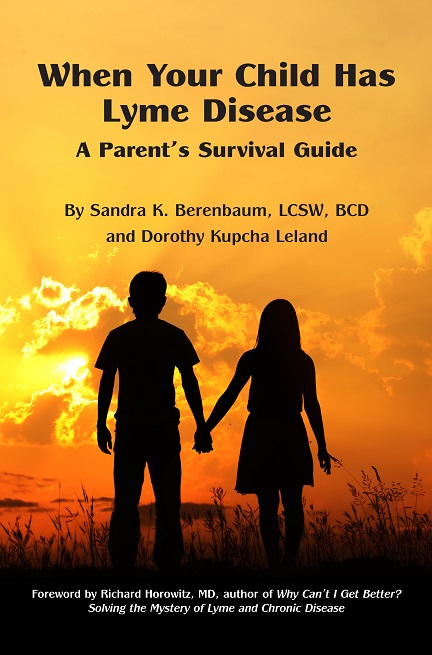When Your Child Has Lyme disease: A Parent’s Survival Guide

For the past several years, I’ve been collaborating with psychotherapist Sandy Berenbaum on a book entitled When Your Child Has Lyme Disease: A Parent’s Survival Guide. Now it has been published! What follows is the book’s preface, explaining our personal reasons for writing this book.
Dorothy Leland:
In 2005, out of the blue, my then-13-year-old daughter became so disabled from a mysterious condition that she was forced to use a wheelchair. At that time, I didn’t even know what Lyme disease was. I didn’t know that our family had fallen into a huge medical controversy, what many have dubbed “The Lyme Wars.” I didn’t know we’d have to battle a medical system that denied her illness. And I did not anticipate the many complex personal and family issues that would arise. We felt alone. But, in fact, we were part of a growing yet invisible group—families grappling with a disease that is ignored by our government and the medical establishment.
It was a long, hard, expensive slog but, eventually, we got through it. We were guided by Internet research and online patient support groups. In time, we found our way to medical practitioners and treatments that put our daughter’s health back on track and allowed her to leave that wheelchair behind for good. At that point, I entered the world of Lyme disease activism. I founded a patient support group, started a blog called Touched by Lyme, and now advocate for the rights of Lyme patients with the national organization LymeDisease.org.
Through these activities, I regularly encounter parents who face the same issues my family did. Many of them are in even more daunting circumstances. The purpose of this book is to shorten the learning curve for parents and family members of children with Lyme disease. I hope it will help them find a path to healing for everyone in the family.
Sandy Berenbaum:
In 1984, I was a psychotherapist in private practice, working with adolescents and their families. I began to experience severe migraine headaches, which worsened over the next six years. None of the specialists I consulted could help me. Then, one day in 1990, I could not hold water in my mouth when I brushed my teeth, because the right side of my face was paralyzed. This was Bell’s palsy, a common symptom of Lyme disease.
I started treatment with one the few Lyme specialists in the country at that time. As it turned out, migraines and a paralyzed face were not my only Lyme-related problems. I also had trouble with sleep, fatigue, concentration, and memory. It took four years of antibiotic therapy to resolve these symptoms.
As I learned more about how Lyme disease can affect the body and the brain, I began to wonder whether some of my young clients might also be infected. After all, since we lived in New York’s highly Lyme-endemic Hudson Valley, we were all exposed to ticks. To my surprise, many of my clients indeed had Lyme at the root of their physical and psychological problems.
As I worked with these adolescents and their parents, I saw the enormous toll Lyme disease takes on whole families. At that time, I knew of no other psychotherapy practices that focused on the unique challenges faced by families of children with Lyme disease. Nor could I find any medical journals that addressed these issues. Thus, my clients and I had to build the road as we traveled on it. Together with my clients, I developed what I now call “responsive psychotherapy,” which is specifically geared towards helping families grappling with tick-borne illnesses.
This book is aimed at parents and other family members of children who are ill with tick-borne diseases. However, I hope mental health practitioners will read it, too. If so, I hope it inspires them to look closely at the possibility of a medical cause for a patient’s “mental illness.”
When Your Child Has Lyme Disease: A Parent’s Survival Guide is available in paperback and e-book from Lyme Literate Press.
TOUCHED BY LYME is written by Dorothy Kupcha Leland, LymeDisease.org’s VP for Education and Outreach. Contact her at dleland@lymedisease.org. On Twitter, she’s @dorothyleland.




















Can’t help wondering why there is no government supported insecticide treatment for areas thick with ticks. Devin granules are very effective
Sevin granules most effective for tick laden yards.
I salute you in you in your effort to help others like us, despite the incredible pain and suffering you have endured. I too am fighting for my life, am on permanent disability, lost my husband to a fatal accident 5 years ago, was forced into Bankrupcy and have been fighting for my life. My saving grace was disguised in trauma. My adult daughter addiction lead her into a criminal charge and 4.5 years in jail. She and my granddaughter have lived with me for most of the 8 years of my granddaughters life, but I had to take custody away from my daughter 2 years ago. My granddaughters love and support are the most powerful medicine. She has given me a purpose to fight even harder. Only she has seen the real devastation this disease has done to my body. I have had two emergency surgeries in the last 18 months. She is terrified of losing me. I live in Maricopa, Arizona near Phoenix area. If anyone knows of a Lyme literate medical doctor that takes Medicare insurance or someone that would help us pro bono, please email me at kathi@kathihughes.com. God bless you for your efforts. I intend to also write about my experiences and remove the suffering from under the carpet, so to speak.
My heart goes out to all suffering from this!
Kathi
This is a welcomed book in the Lyme community for mothers and students to learn and maneuver the many obstacles involved . Thank you (psychotherapist Sandy Berenbaum on a book entitled When Your Child Has Lyme Disease